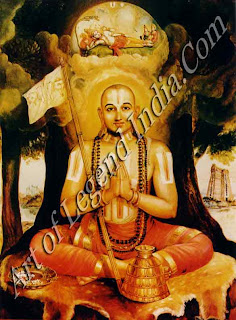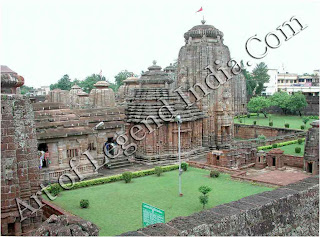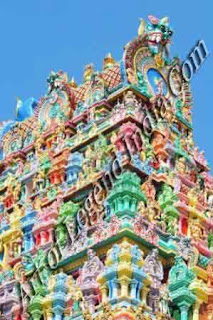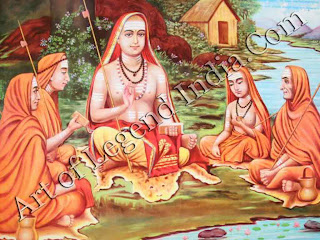 The sixth or the last set of scriptures is the six
Darshanas (meaning visions) which are schools of philosophy. These are for the
intellectuals and the scholars who have six main schools of philosophic thought
to guide them. They are Nyaya founded by Gautama Rishi, Vaiseshika by Kanada,
Sankhya by Kapila Muni, Yoga by Patanjali, Mimamsa by Jaimini and Vedanta by
Badarayana (Vyasa).
The sixth or the last set of scriptures is the six
Darshanas (meaning visions) which are schools of philosophy. These are for the
intellectuals and the scholars who have six main schools of philosophic thought
to guide them. They are Nyaya founded by Gautama Rishi, Vaiseshika by Kanada,
Sankhya by Kapila Muni, Yoga by Patanjali, Mimamsa by Jaimini and Vedanta by
Badarayana (Vyasa).
The philosophy of Nyaya is
guided by pure logic and reasoning. Although this system itself is not popular
today, its emphasis on logic and tarka or debate, has influenced all thinking
in India through the ages.
The Vaiseshika school is the
earliest in the world to talk of the universe as consisting of countless atoms
each with its own visesha or particular quality. The Nyaya and Vaiseshika
doctrines merge into one another and are studied together.
The Sankhya system also
emphasises logic and inference but its main belief is that the universe
consists of two elements, purusha and prakriti (spirit and matter). It is the
oldest school of all and mention is made of it in the Mahabharata.
The Yoga school accepts Sankhya
philosophy but uses the system of mind control as the means of attaining
God-head.
Mimamsa places great emphasis
on Vedic rituals and sacrifices. (Yajna, the ritual of sacrifice, does not mean
animal sacrifice, as is often misunderstood, but means the chanting of the
Vedas while melted butter (ghee), grain and other offerings are poured into the
sacred fire.) Vedanta, meaning the end of the Vedas, bases its doctrine on the
Upanishads. Of the six schools of philosophy, it is considered the most valid
for the times we live in. For example, it teaches that the Supreme God can be
reached only by one's own individual spiritual experience. Such a school of
thought is more acceptable to the modern mind.
Each Veda has a Karma Kanda
dealing with rituals, Upasana Kanda dealing with worship, and Jnana Kanda
dealing with spiritual knowledge. Of the six schools, Vedanta holds that the
Jnana Kanda or the path of knowledge is all-important and the other paths are
merely steps to the final goal.
 Vedanta insists on strict
adherence to Truth and to tireless investigation. Thousands of years ago our
ancients taught what is today in conformity with the modern scientific
approach. The Manduka Upanishad says, "The path to the Divine is through
Truth. Victory lies only with Truth. Untruth can never win". This emphasis
on truth, investigation and individual spiritual experience makes Vedanta a
philosophy appealing to the young and to the old. It is eternal and is
applicable to all peoples and races of the thinking world.
Vedanta insists on strict
adherence to Truth and to tireless investigation. Thousands of years ago our
ancients taught what is today in conformity with the modern scientific
approach. The Manduka Upanishad says, "The path to the Divine is through
Truth. Victory lies only with Truth. Untruth can never win". This emphasis
on truth, investigation and individual spiritual experience makes Vedanta a
philosophy appealing to the young and to the old. It is eternal and is
applicable to all peoples and races of the thinking world.
All thinking in India has been
affected by Vedanta which, even though we may not be aware of it, is the very
root of our culture and beliefs. The Upanishads, the Vedanta Sutras and the
Bhagavad Gita are called the Prasthana Traya, or the three authoritative
scriptures of Hinduism. The three great commentators on the Vedanta Sutras were
Adi Shankara, Ramanuja and Madhvacharya.
 Vedanta has influenced great
thinkers from time immemorial. Greek thinkers like Plato and later European
philosophers like Spinoza, Nietzche and Schophenhauer were influenced by
Vedantic philosophy as expounded by the ancient Rishis of the Upanishadic
period, as have been philosophers all over the world through the ages, some
subtly others overtly.
Vedanta has influenced great
thinkers from time immemorial. Greek thinkers like Plato and later European
philosophers like Spinoza, Nietzche and Schophenhauer were influenced by
Vedantic philosophy as expounded by the ancient Rishis of the Upanishadic
period, as have been philosophers all over the world through the ages, some
subtly others overtly.
Vedanta appeals to the mind and
to one's logical understanding. It gives satisfactory answers to the spiritual
doubts of wise men at all times in all ages. It is a school of philosophy that
appeals equally to the mystical minds of the Seers of the East, and to the
philosophers of the Western world who are conditioned by a pragmatic and
scientific environment.
Writer
– Shakunthala Jagannathan
 The sixth or the last set of scriptures is the six
Darshanas (meaning visions) which are schools of philosophy. These are for the
intellectuals and the scholars who have six main schools of philosophic thought
to guide them. They are Nyaya founded by Gautama Rishi, Vaiseshika by Kanada,
Sankhya by Kapila Muni, Yoga by Patanjali, Mimamsa by Jaimini and Vedanta by
Badarayana (Vyasa).
The sixth or the last set of scriptures is the six
Darshanas (meaning visions) which are schools of philosophy. These are for the
intellectuals and the scholars who have six main schools of philosophic thought
to guide them. They are Nyaya founded by Gautama Rishi, Vaiseshika by Kanada,
Sankhya by Kapila Muni, Yoga by Patanjali, Mimamsa by Jaimini and Vedanta by
Badarayana (Vyasa).  Vedanta insists on strict
adherence to Truth and to tireless investigation. Thousands of years ago our
ancients taught what is today in conformity with the modern scientific
approach. The Manduka Upanishad says, "The path to the Divine is through
Truth. Victory lies only with Truth. Untruth can never win". This emphasis
on truth, investigation and individual spiritual experience makes Vedanta a
philosophy appealing to the young and to the old. It is eternal and is
applicable to all peoples and races of the thinking world.
Vedanta insists on strict
adherence to Truth and to tireless investigation. Thousands of years ago our
ancients taught what is today in conformity with the modern scientific
approach. The Manduka Upanishad says, "The path to the Divine is through
Truth. Victory lies only with Truth. Untruth can never win". This emphasis
on truth, investigation and individual spiritual experience makes Vedanta a
philosophy appealing to the young and to the old. It is eternal and is
applicable to all peoples and races of the thinking world.  Vedanta has influenced great
thinkers from time immemorial. Greek thinkers like Plato and later European
philosophers like Spinoza, Nietzche and Schophenhauer were influenced by
Vedantic philosophy as expounded by the ancient Rishis of the Upanishadic
period, as have been philosophers all over the world through the ages, some
subtly others overtly.
Vedanta has influenced great
thinkers from time immemorial. Greek thinkers like Plato and later European
philosophers like Spinoza, Nietzche and Schophenhauer were influenced by
Vedantic philosophy as expounded by the ancient Rishis of the Upanishadic
period, as have been philosophers all over the world through the ages, some
subtly others overtly. 











0 Response to "The Darshanas of God"
Post a Comment